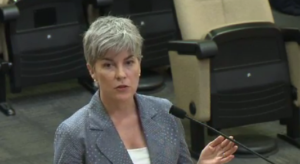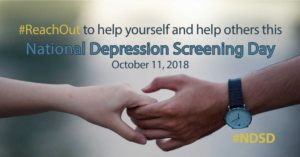TRANSPARENCIES
A monthly newsletter from Integral Care.
A monthly newsletter from Integral Care.

A Message From Our CEO

Chief Strategy Officer Ellen Richards provides comments to Austin City Council members during public hearing on August 22nd
To begin, I’d like to express my gratitude to the Austin City Council and Travis County Commissioners Court for allocating $1.9 million to continue the vital work of our Expanded Mobile Crisis Outreach Team (EMCOT) through FY 2019. Due to changes in the federal 1115 Medicaid Waiver, we were no longer able to support EMCOT. With City and County support, we will continue to respond to community members experiencing mental health crises and connect them with appropriate care and treatment.
Mental health crises are costly for individuals and our local systems. They can be draining emotionally and financially, and can result in life-threatening situations. A mental health screening is the first step to linking at-risk individuals with treatment options before a mental health issue becomes a mental health crisis.
October 11th is National Depression Screening Day, an effort started by Screening for Mental Health, which envisions mental health treated with the same weight and respect as physical health. Mental and physical health are interrelated and when untreated, mental health issues can lead to physical health problems and vice versa. Primary care providers (PCPs) consistently screen for important general health markers – high blood pressure, high cholesterol, respiratory health, diabetes and more. Why not mental health? Did you know that nearly 50% of people who die by suicide have seen their PCP within a month of the event? Asking just a few questions could help save a life. And, various healthcare professionals can do it – a doctor, a nurse or a medical assistant.
The positive impact of administering a short questionnaire is significant. Beyond helping identify a mental illness early, which could mean more effective treatment and lowered healthcare costs for the individual, screening reduces stigma.
 In 2015, about three percent of adults were screened for depression by PCPs. In January 2016, the U.S. Preventative Services Task Force (a federal government advisory group) recommended that all primary care providers screen adults and adolescents age 12 and older for depression. While there has been positive movement, rates remain low.
In 2015, about three percent of adults were screened for depression by PCPs. In January 2016, the U.S. Preventative Services Task Force (a federal government advisory group) recommended that all primary care providers screen adults and adolescents age 12 and older for depression. While there has been positive movement, rates remain low.
Each of us can bolster the effort to screen for depression. If you or someone you know is showing signs or symptoms of depression, I encourage you to reach out for help. Talk to a healthcare professional – whether it is your PCP or a mental health professional – and get screened. If that feels like too much, take a quick online anonymous screening or call Integral Care’s 24/7 Crisis Helpline at 512-472-HELP (4357). We are here to support you – recovery from a mental health condition is possible.

David Evans
Chief Executive Officer
Farewell to Retiring Board Members
This month, Integral Care says farewell and thank you to two long-time board members who have contributed to our success for a combined 35 years of service – Richard E. Hopkins and Robert T. Chapa, Jr.
 Richard Hopkins was appointed to the board by the Travis County Commissioners Court in 1993. He was instrumental in the creation and development of the Central Texas African American Family Support Conference, a two-day community event hosted by Integral Care. Integral Care’s location on Airport Blvd, which houses Psychiatric Emergency Services (our mental health urgent care walk-in clinic) and other vital programs, is named in his honor. Mr. Hopkins will continue to serve on the board of New Milestones Foundation, a non-profit organization that raises funds for Integral Care’s programs and services.
Richard Hopkins was appointed to the board by the Travis County Commissioners Court in 1993. He was instrumental in the creation and development of the Central Texas African American Family Support Conference, a two-day community event hosted by Integral Care. Integral Care’s location on Airport Blvd, which houses Psychiatric Emergency Services (our mental health urgent care walk-in clinic) and other vital programs, is named in his honor. Mr. Hopkins will continue to serve on the board of New Milestones Foundation, a non-profit organization that raises funds for Integral Care’s programs and services.
 Robert T. Chapa, Jr. was appointed to the board in 2004 by the City of Austin, carrying on the legacy of his father, Robert T. Chapa, Sr. For many years, he chaired our Board’s Finance Committee and helped ensure the fiscal stability of the organization. Mr. Chapa is a dedicated community servant. He leads a charity golf tournament, named for his father, that raises funds to support Hispanic youth in our community. His efforts improve the lives of many in our community.
Robert T. Chapa, Jr. was appointed to the board in 2004 by the City of Austin, carrying on the legacy of his father, Robert T. Chapa, Sr. For many years, he chaired our Board’s Finance Committee and helped ensure the fiscal stability of the organization. Mr. Chapa is a dedicated community servant. He leads a charity golf tournament, named for his father, that raises funds to support Hispanic youth in our community. His efforts improve the lives of many in our community.
We thank Mr. Hopkins and Mr. Chapa for their years of dedication and significant contributions to Integral Care.
CommUnityCare
We are proud to report that our partner in healthcare, CommUnityCare, screens every one of their primary care patients for depression. They use the Patient Health Questionnaire 2/9 to determine whether an individual should be referred to a mental health care provider. They give the Generalized Anxiety Disorder-7 screening as needed and give all post-partum patients the Edinburgh Depression screening.
 CommUnityCare provides patient-centered care that considers mental health as important as physical health. Dr. Nicholas Yagoda, their Director of Primary Care, believes that “in order to provide comprehensive primary care, you have to assess the mental health of a person as well. Depression screenings are a core part of quality primary health care delivery.”
CommUnityCare provides patient-centered care that considers mental health as important as physical health. Dr. Nicholas Yagoda, their Director of Primary Care, believes that “in order to provide comprehensive primary care, you have to assess the mental health of a person as well. Depression screenings are a core part of quality primary health care delivery.”
CommUnityCare has 24 locations and seven co-locations with partners throughout Travis County. Integral Care and CommUnityCare have worked together for more than a decade to provide integrated primary, mental health and substance use disorder services. Integral Care has staff within many CommUnityCare locations and CommUnityCare serves out of three Integral Care clinics. Their street medicine teams are also in the community providing acute care to people experiencing homelessness. As a Federally Qualified Health Center, they ensure that a local system of primary health care exists for our community members – whether insured or uninsured.
We applaud CommUnityCare’s approach and their fantastic work in the community. Together, we ensure that the people of Austin-Travis County have access to the care they need. And, if someone is at-risk of depression, they are screened and connected to appropriate treatment and support.
October: A Few Questions Could Help Save a Life
September: Anyone Can Save a Life
August: A Milestone Moment
July: Equity in Mental Health Care for All
June: Expanding Services for Veterans
May: Your Mental Health Toolkit
April: Time of Terror Calls for Increased Emotional Support
March: Stopping the cycle of incarceration for individuals with mental illness
February : Equity in mental healthcare for everyone
January : Improving Mental Health Through Partnership & Collaboration
December : Strength Through Community
November : Healthy Lifestyles Improve Well-Being
October : National Child Health Day
September : Strengthening Families and Communities